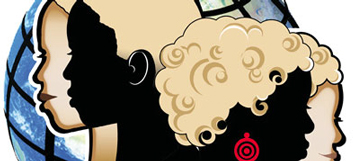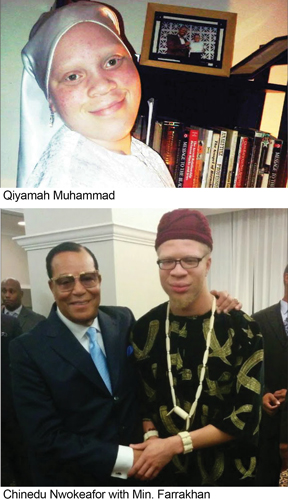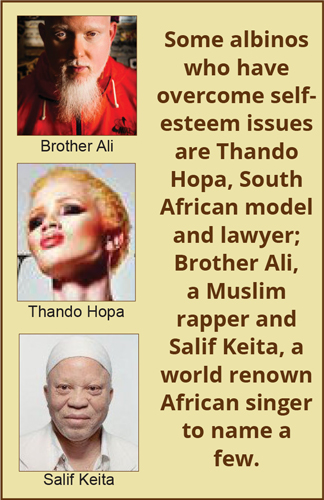Junior Vanguard promotes Justice for the Albino Community
By Final Call News | Last updated: Apr 12, 2016 - 8:29:28 PMWhat's your opinion on this article?

|
When she was younger, she used to get the stares and questions. Not so much the questions now, but people still stare. Some of the most common questions asked were: “Are you Black?” “Are you sure?” and “Can you stop moving your eyes like that?” It used to bother her but because she has a strong support system with her family and the Nation of Islam, who always instilled pride in not only her Blackness but also being proud of who she is in her uniqueness as an albino, she has confidence in herself.

|
Now there has come a call from the Washington, D.C., community asking Qiyamah to talk to children who are albino because they have low self-esteem. That inspired her to start Confident Albino Brothers and Sisters to help other albinos increase self-esteem. C.A.B.S meets once a month at the Emergence Community Arts Collective in D.C. with an average of 15 people participating so far. Other albinos have connected with the group through social media, Facebook, Twitter and Instagram. The goal is to be able to provide more information to people about albinism, go into schools and educate students, bring attention to the killing of albinos in other countries and provide necessary skin protection to albinos who live in safe houses in Africa.
Qiyamah, who has had several meetings since starting her group, is organizing a conference for the 2nd Annual International Albinism Awareness Day June 13 started by the United Nations. Her theme is “Justice for Albinos.”
Justice means the quality of being just, impartial, or fair. Qiyamah’s goal is to help bring awareness to the plight of albinos in Africa to help them obtain justice. Her hope is that the Honorable Minister Louis Farrakhan might be the keynote speaker for her event.
Albinism is an inherited condition which comes from both parents. People with albinism have little to no melanin, which is a chemical that colors skin, eyes and hair. Therefore, people with albinism lack pigmentation which is the coloring of a person’s skin, in all three. Albinism affects people of all races and is much more common than one might think. In fact, one out of every 20,000 people worldwide has some form of albinism. In some populations, like Nigeria, it occurs in one out of every 200 births.

|
At the same time, people with albinism have also been ostracized and even killed for exactly the opposite reason—because they are presumed to be cursed and bring bad luck. The persecution of people with albinism takes place mostly in Sub-Saharan African communities, and especially among East Africans. Because of that, on December 18, 2014, the United Nation’s General Assembly adopted a resolution proclaiming June 13 as International Albinism Awareness Day.
Some albinos who have overcome self-esteem issues are Thando Hopa, South African model and lawyer; Brother Ali, a Muslim rapper and Salif Keita, a world renown African singer to name a few.
Minister Farrakhan said of student leader Chinedu Nwokeafor, who overcame great obstacles to bring the Minister to Morgan State University in 2014, “He’s the greatest proof that all people came from us. There would be no Brown, no Red, no Yellow if there were no Black. Black is not a color. It is the essence from which color comes. So you should never be ashamed of your blackness. Celebrate it.” Brother Chinedu is an albino from Nigeria.
Qiyamah is homeschooled and lives with her parents Anthony K. and Angela Muhammad, director of “The Million Man March—The Untold Story” documentary, and her brother Asad Muhammad. They attend Muhammad Mosque No. 4 in Washington, D.C.
For more information on how you can support Confident Albino Brothers and Sisters, email [email protected] or visit our Facebook page, Confident Albino Brothers and Sisters. To make a donation to help C.A.B.S, go to http://caps.mydagsite.com.
INSIDE STORIES AND REVIEWS
-
-
About Harriett ... and the Negro Hollywood Road Show
By Rabiah Muhammad, Guest Columnist » Full Story -
Skepticism greets Jay-Z, NFL talk of inspiring change
By Bryan 18X Crawford and Richard B. Muhammad The Final Call Newspaper @TheFinalCall » Full Story -
The painful problem of Black girls and suicide
By Charlene Muhammad -National Correspondent- » Full Story -
Exploitation of Innocence - Report: Perceptions, policies hurting Black girls
By Charlene Muhammad -National Correspondent- » Full Story -
Big Ballin: Big ideas fuel a father’s Big Baller Brand and brash business sense
By Bryan Crawford -Contributing Writer- » Full Story






 Click Here Stay Connected!
Click Here Stay Connected!








